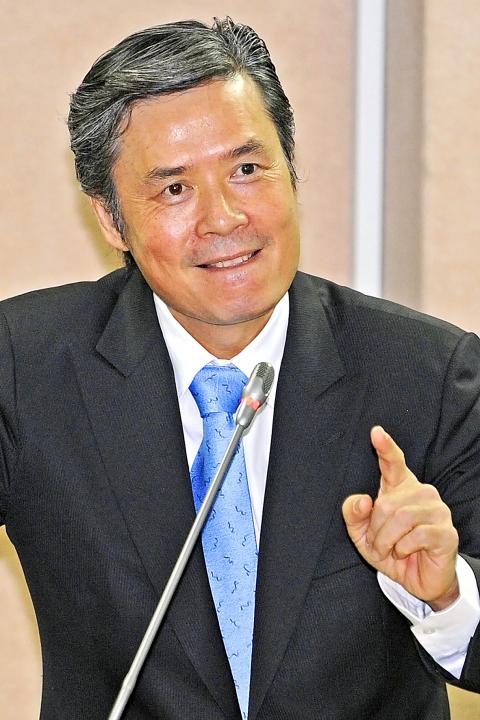Democratic Progressive Party (DPP) Legislator Gao Jyh-peng (高志鵬) yesterday questioned National Security Council (NSC) Secretary-General King Pu-tsung (金溥聰) on his alleged meetings with Chinese Embassy Minister Wu Xi (吳璽) last year when King was representative to the US, accusations that King quickly denied.
King made his first visit to the legislature’s question-and-answer session for the Judiciary and Organic Laws and Statues Committee meeting yesterday since becoming head of the NSC in March.
With Chinese Nationalist Party (KMT) lawmakers almost completely absent, opposition legislators focused their questioning on allegations that King had overreached his authority in visits to agencies not under his jurisdiction and his role in the ousting of former Mainland Affairs Council (MAC) deputy minister Chang Hsien-yao (張顯耀).

Photo: Chen Chih-chu, Taipei Times
Gao asked King whether he, along with with Army Major General Lee Hsien-sheng (黎賢聖), then military attache, had met with Wu to discuss a possible meeting between President Ma Ying-jeou (馬英九) and Chinese President Xi Jinping (習近平) on Dec. 25 last year.
Gao said Lee had failed lie detector tests involving several questions about China five times. King said that Lee’s floundering on the test seemed to pertain to his own personal affairs, but the investigation is still ongoing.
Gao also said that Chang was ousted because, having attained information about the meeting through the CIA, he reported to Ma about King’s attempt to establish private relations with China, a move that had “touched a nerve with” King.
King denied that he had met with a Chinese official in the US and that he had meddled with the personnel issues of the MAC.
However, the NSC secretary-general stumbled on a question by People First Party Legislator Thomas Lee (李桐豪) about the NSC’s wiretapping of Chang.
King stuttered when he said that, based on his understanding, “[Chang’s] case involved many people, who were indeed wiretapped, but no such action was undertaken against Chang himself.”
He added that the person who did the wiretapping did not conduct the surveillance in Taiwan.
Gao later told reporters that King had met with the Chinese envoy twice and the clandestine rendezvous was not only about a Ma-Xi meeting, but had also touched upon a potential cross-strait mutual trust mechanism.

SHIPS, TRAINS AND AUTOMOBILES: The ministry has announced changes to varied transportation industries taking effect soon, with a number of effects for passengers Beginning next month, the post office is canceling signature upon delivery and written inquiry services for international registered small packets in accordance with the new policy of the Universal Postal Union, the Ministry of Transportation and Communications said yesterday. The new policy does not apply to packets that are to be delivered to China, the ministry said. Senders of international registered small packets would receive a NT$10 rebate on postage if the packets are sent from Jan. 1 to March 31, it added. The ministry said that three other policies are also scheduled to take effect next month. International cruise ship operators

NUMBERS IMBALANCE: More than 4 million Taiwanese have visited China this year, while only about half a million Chinese have visited here Beijing has yet to respond to Taiwan’s requests for negotiation over matters related to the recovery of cross-strait tourism, the Tourism Administration said yesterday. Taiwan’s tourism authority issued the statement after Chinese-language daily the China Times reported yesterday that the government’s policy of banning group tours to China does not stop Taiwanese from visiting the country. As of October, more than 4.2 million had traveled to China this year, exceeding last year. Beijing estimated the number of Taiwanese tourists in China could reach 4.5 million this year. By contrast, only 500,000 Chinese tourists are expected in Taiwan, the report said. The report

The Forestry and Nature Conservation Agency yesterday launched a gift box to market honey “certified by a Formosan black bear” in appreciation of a beekeeper’s amicable interaction with a honey-thieving bear. Beekeeper Chih Ming-chen (池明鎮) in January inspected his bee farm in Hualien County’s Jhuosi Township (卓溪) and found that more than 20 beehives had been destroyed and many hives were eaten, with bear droppings and paw prints near the destroyed hives, the agency said. Chih returned to the farm to move the remaining beehives away that evening when he encountered a Formosan black bear only 20m away, the agency said. The bear

HORROR STORIES: One victim recounted not realizing they had been stabbed and seeing people bleeding, while another recalled breaking down in tears after fleeing A man on Friday died after he tried to fight the knife-wielding suspect who went on a stabbing spree near two of Taipei’s busiest metro stations, Taipei Mayor Chiang Wan-an (蔣萬安) said. The 57-year-old man, identified by his family name, Yu (余), encountered the suspect at Exit M7 of Taipei Main Station and immediately tried to stop him, but was fatally wounded and later died, Chiang said, calling the incident “heartbreaking.” Yu’s family would receive at least NT$5 million (US$158,584) in compensation through the Taipei Rapid Transit Corp’s (TRTC) insurance coverage, he said after convening an emergency security response meeting yesterday morning. National